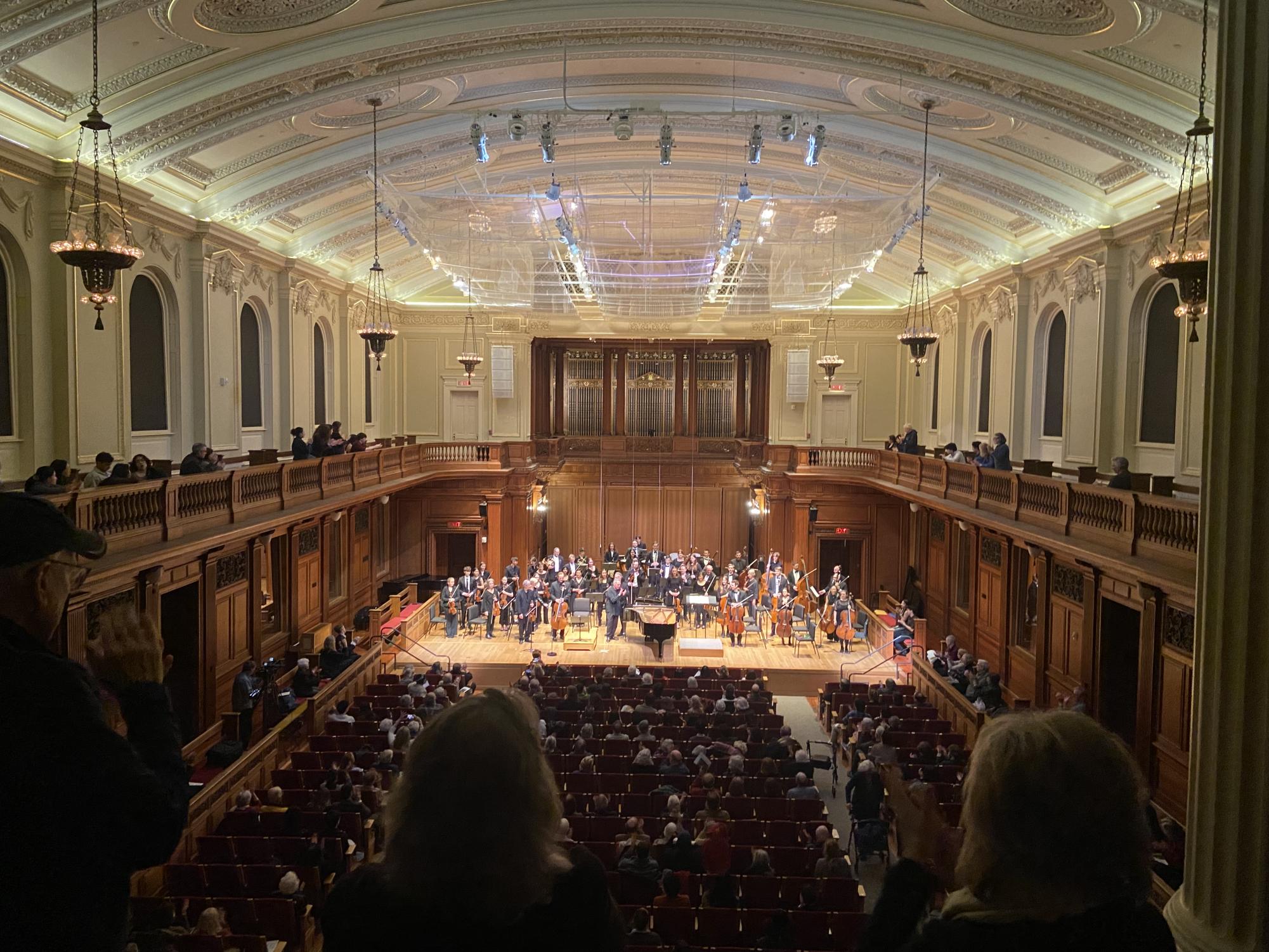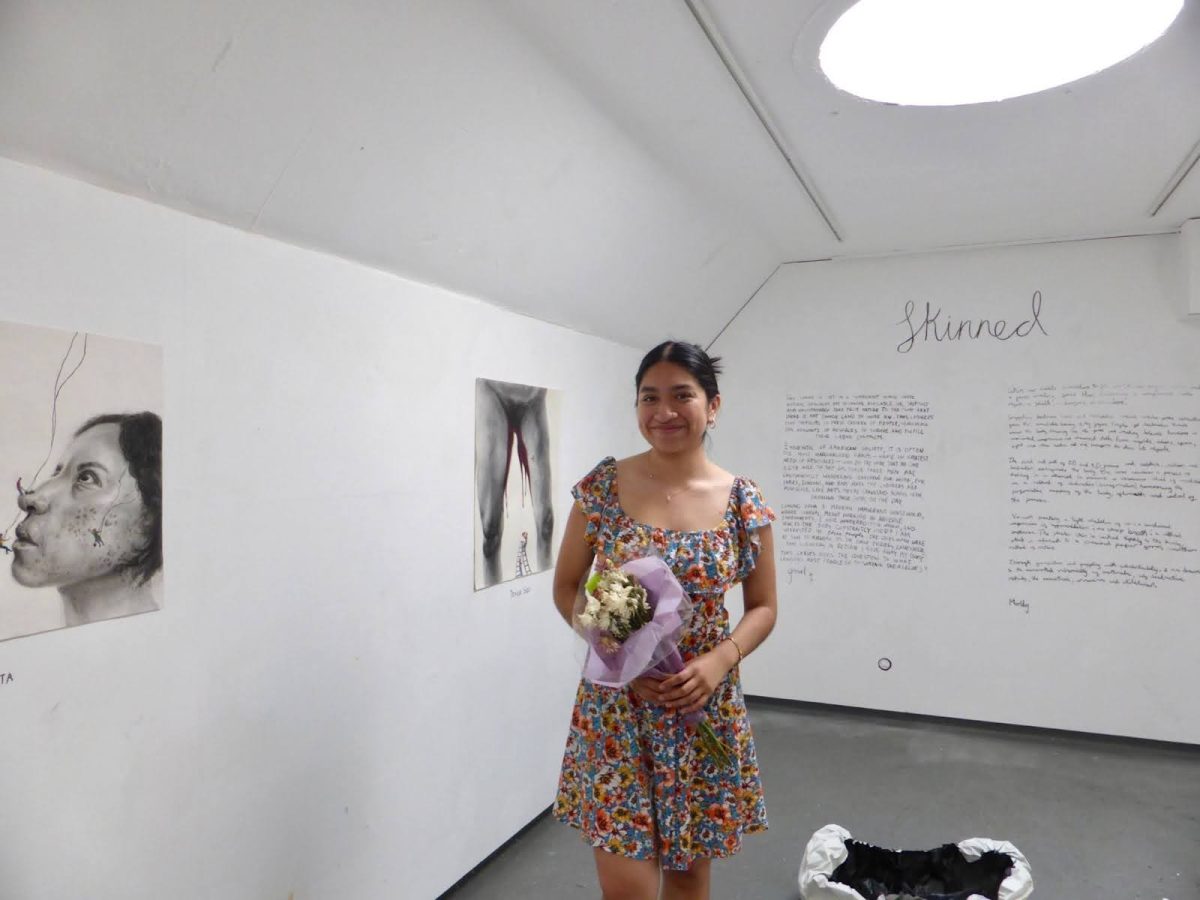
The music department presented the annual Student Soloist Gala on Friday, March 8. The gala featured five student soloist performers accompanied by the Berkshire Symphony Orchestra, followed by a rendition of Beethoven’s “Triple Concerto” that featured violinist Eugene Drucker, cellist Sebastian Bäverstam, and pianist Jonathan Feldman. The three guest performers taught master classes at the College the week leading up to the performance.
The gala was dedicated to the memory of Toby Woods ’27, a dedicated musician and member of the Berkshire Symphony Orchestra, who died in February. His chair was left open in the cello section, and Julian Müller, artist associate in cello and principal cellist, gave a speech memorializing Woods, who was his student, before the performance of “Triple Concerto.” “Hopefully, we can listen to these pieces, all music, and each other with the vulnerable, empathetic, open, and kind demeanor Toby displayed,” Müller said. “Thank you, Toby, for being a vessel that exemplifies the joyous ideals of life for us all to continue to pursue.”
Before the gala began, Ronald Feldman, artist in residence in orchestral and instrumental activities, lecturer in music, and director of the Berkshire Symphony, addressed the crowd in the Brooks-Rogers Recital Hall. He spoke of his relationship to each of the guest performers. “I’ve had the good fortune of playing a couple of concerts with [Drucker],” he said. “He is what I call a maestro.” He was also Bäverstam’s professor from the age of 14 to when he entered the New England Conservatory, and he said he “realized within a couple of months that you don’t mess with that kind of talent.” The director reminisced about playing music with his brother, pianist Jonathan Feldman, in their youth. “He’s one of those players that just knows what’s going on,” he said.
Cello soloist Rachel Broweleit ’24 opened the show with a performance of Edward Elgar’s “Cello Concerto in E Minor,” a dramatic but sorrowful piece lamenting the destruction of postwar Europe. Her performance of the concerto’s lilting refrain carried the piece from its somber beginnings to a swelling of triumph at the end. “There have only been two cellists in my time at the College that really stand out the way Rachel has been playing,” Ronald Feldman said.
Ronald Feldman is also a cellist, which strengthened and informed his teaching of Broweleit. “I felt so lucky to be directed by a fellow cellist,” Broweleit wrote to the Record. “Ronny has such a deep understanding of the Elgar [piece] that he was able to catch all of my unpredictable entrances and tempo changes in the first rehearsal… His sensitivity for the piece really made the music come alive.”
Soprano Molly Arts ’24 followed Elgar’s concerto with a rendition of “Chi il bel sogno di Doretta,” an aria from Giacomo Puccini’s opera La Rondine. In the show, the song is performed by Magda — the protagonist who escapes the banality of her life through a spontaneous love affair. Arts’ performance conveyed Magda’s dreaminess and her desire for a life of excitement. “The elongated high notes have both such power and gentleness to them that they must be carefully sung (specifically by changing resonance placement) to evoke these contrasting qualities,” Arts wrote to the Record.
Violinist Weiran Jiang ’26 followed Arts with Ernest Chausson’s Poéme. Both meditative and fraught with energy, at times her violin fell silent, with the rest of the orchestra pulling back, creating a palpable stillness in the room. “She is a conservatory level player, not just someone who could get in, but someone who could excel,” Ronald Feldman said of Jiang during his address. “She’s playing a tremendously difficult piece, but you would never know it from the way she plays it.”
The next performer was baritone Edmond Laird-Raylor’s ’24, who sang “Avant de Quitter Ces Lieux” from Charles Gounod’s opera Faust. The song is a rousing battle speech, and Laird-Raylor’s performance embodied the soldierly conviction of Valentin — the character who sings the song in the opera. In his address, Ronald Feldman characterized Laird-Raylor, who had never trained as an opera singer before coming to the College, as “probably one of two wonderful baritones that we’ve had over the years.”
Laird-Raylor emphasized the challenge of singing with an orchestra without losing the expressiveness of vocal performance. “It’s easier for an entire orchestra to just play the music as written in time, but if I want to hold a G [note] for five seconds when I’m only supposed to hold it for one because it’s dramatic and it adds flair, I have to communicate that,” he said in an interview.
The final student soloist of the gala, pianist Janine Wang ’26, performed the Allegramente movement of Maurice Ravel’s “Piano Concerto in G Major.” Drawing from innovative jazz rhythms and African American spirituals of the Roaring Twenties, the concerto is a medley of rhythms, with a glittering harp sequence and percussive clap sparking the beginning of the piece. Throughout the performance, Wang moved across the entire length of the keyboard with apparent ease, driving the movement’s frenetic pace.
“Learning the actual notes was one thing, but another was to go beyond the notes, to get to a place where the technical demands of the piece fade into the backdrop and you can try to convey something more with your playing,” Wang wrote to the Record. “In my approach, I tried to maintain a certain humility and sincerity, which I hope I got across.”
As the soloist performances closed, the symphony prepared for its performance of Ludwig van Beethoven’s “Triple Concerto” in C Major. The performance blended the expansive and dynamic sounds of an orchestra with the solos of the trio at its center. “This was my first performance of the Beethoven ‘Triple Concerto,’” Drucker wrote to the Record. “It’s a challenging work for all three solo instruments, especially for the cello, because the solo part lies in such a high register. Sebastian Bäverstam played it brilliantly.”
Drucker also said that collaborating with Ronald Feldman as a conductor was special. “Having previously worked with him in chamber music, where he was playing the cello, I now had the opportunity to enjoy this other side of his musicianship,” he wrote. “It was also a special pleasure to work for the first time with his brother, Jonathan Feldman, an excellent pianist who also happened to be my roommate during my last year as a student at the Juilliard School.”
“This may sound cliché, but the musical opportunities here have changed my life,” Arts wrote. “I came into Williams as a varsity swimmer and [computer science] and math double major, with singing only as a small hobby, and I am leaving as someone who wants to pursue a career in opera and theatre… I am so grateful that Williams’ music education allowed me to discover and explore my passion.”







